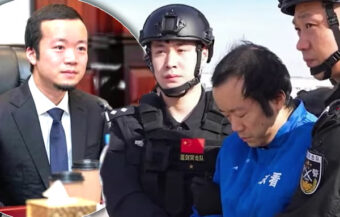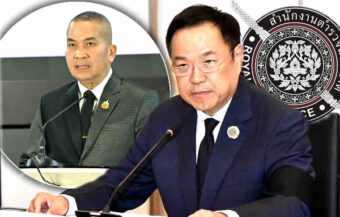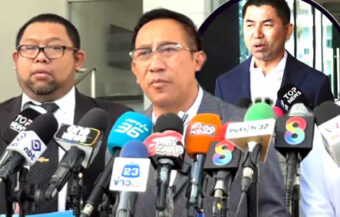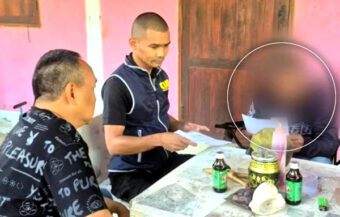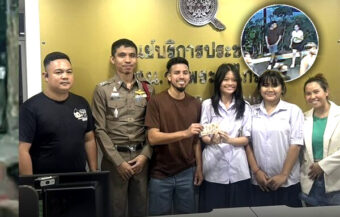Border tensions erupt as Thai army warns of war over Cambodian buildup. PM urges calm, but conservatives rally, demanding action. With 12,000 enemy troops near Chong Bok and ICJ threats looming, June 14 talks may be the last chance to avoid full-blown conflict.
Rising tensions on the Thai-Cambodia border are threatening to spill over into politics. Following a meeting on Friday of top military leaders, the situation was described as “worrisome.” The statement was in contrast to earlier remarks by Thailand’s civilian government, which hopes the impasse can be solved between the two countries at negotiations scheduled for June 14th. However, the government is left in a difficult position. On one hand, it cannot accede to territorial loss; on the other hand, a military escalation would be disastrous for the kingdom at this time. In the meantime, the clamour from Thailand’s right-wing conservatives is growing. At the same time, the government of Paetongtarn Shinawatra—who only weeks ago hailed warm Cambodian-Thai relations—looks increasingly frail and rudderless.
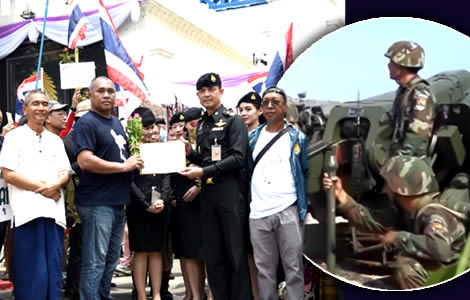
Thailand’s military issued its sharpest warning yet on Friday, calling Cambodia’s troop buildup along the eastern border “worrisome.” Officials said the armed forces were ready to launch a “high-level military operation” if Thai sovereignty was violated. The threat followed a deadly firefight on May 28 that left one Cambodian soldier dead and tensions flaring across the region.
Although the civilian government has urged calm, the army’s tone has grown steadily more assertive. After a National Security Council meeting on Friday, Prime Minister Paetongtarn Shinawatra insisted that dialogue remained Thailand’s priority.
However, she also confirmed the army was “clearly prepared” for military action if needed. Her remarks signalled alignment with military commanders, who now view the situation as dangerously unstable.
Thai army declares full readiness for high-level operation as Cambodia moves troops closer to flashpoint zones
The armed forces reinforced her message with a statement warning they would retaliate immediately against any violation. “The army is now ready for a high-level military operation in case it is necessary,” the statement read. “We will protect sovereignty and ensure the safety of the people.”
Top brass met Friday morning behind closed doors to evaluate the situation. Supreme Commander General Songwit Noonpakdee chaired the meeting, which brought together commanders from all branches. No media were allowed inside. Security analysts believe the closed-door format reflected the gravity of the crisis.
Meanwhile, Thai intelligence has tracked a steady flow of Cambodian troops into the disputed Chong Bok area in Ubon Ratchathani province. This border zone was the site of last week’s clash. According to Thai media, Cambodia has now deployed over 12,000 troops near the border. Reports say the reinforcements include tanks, mobile rocket systems, heavy artillery, and armoured vehicles.
Elsewhere in Sa Kaeo Province, Thai troops reported confrontations with Cambodian soldiers seen digging trenches and fortifying temporary positions. While no shots were fired, verbal altercations escalated before the Cambodians withdrew. Still, Thai officers warned the situation remained extremely fragile.
Cambodia signals possible ICJ appeal as Thai royalists rally and 2013 Preah Vihear anger resurfaces
Cambodia has not formally responded to Friday’s military threat. However, earlier this week Phnom Penh said it planned to take the dispute to the International Court of Justice (ICJ). Thailand immediately rejected that approach. Officials said the ICJ had no jurisdiction over the current dispute, and warned that taking the matter global would only inflame tensions.
This legal standoff echoes the 2013 ruling over the Preah Vihear temple. At that time, the ICJ ruled in favour of Cambodia. Basically, it clarified a prior 1962 ruling. Thai troops were forced to pull back, sparking nationalist anger and political protests at home. Now, memories of that loss are resurfacing.
Royalist activists in Bangkok have begun rallying again. On Friday, demonstrators gathered outside the Cambodian Embassy, waving flags and demanding strong action. The protest was small but symbolically potent. Many of the same activists played key roles during Thailand’s 2006 and 2014 military coups.
In another development, Army Spokesman Major General Winthai Suvari met with conservative civil groups to accept letters of support. That was on Thursday. The groups included the People’s Democratic Reform Committee (PDRC), the Dharma Army and other conservative networks that have previously backed military interventions. The ceremony took place at army headquarters, with a portrait of the King watching over the scene.
Calls for escalation grow louder as conservatives back the military and General Prawit warns against weakness
“The army confirms it will supervise personnel to protect sovereignty and care for the people,” Winthai told reporters. “We thank the civil sector for understanding the military’s duty in this situation.”
Notably, strident conservative voices are becoming louder. Former Deputy Prime Minister General Prawit Wongsuwon, now leader of the Palang Pracharath Party, issued a fiery statement Friday. “We call on the government to act decisively,” he said. “This requires countermeasures across diplomacy, law, economy and defence.”
Prawit emphasized that Thailand must be ready for any outcome. “We don’t want conflict, but we cannot appear weak,” he warned. “If the other side escalates, we must respond in kind.” He singled out the 2nd Army Region, which covers Thailand’s eastern provinces, for praise. “These troops are our frontline. If even one inch of Thai soil is breached, we must defend it with our lives.”
That statement echoed across social media, where calls for a tougher stance have been growing. Right-wing influencers and former generals have urged full mobilization. Some even accused the civilian government of being too slow to act.
Paetongtarn insists on diplomacy but Thai army steps up readiness with tighter logistics and preparedness
In response, the Prime Minister’s Office reiterated that diplomacy remains the goal. Deputy Prime Minister Phumtham Wechayachai said Thailand must resolve the issue “without disadvantage.” He stressed that bilateral mechanisms were still the preferred path. “The government, military, and people must stand united,” he said. “This is the only way to protect both peace and sovereignty.”
Even so, military officials confirmed Friday that forces were already on heightened alert. Troops stationed near Ubon Ratchathani and Sa Kaeo had been instructed to proceed cautiously—but decisively—if provoked. Logistics operations have also been ramped up. Supply routes to remote army outposts have been secured, and mobile medical units have been moved closer to the border.
A National Security Council task force will now oversee the situation daily. According to insiders, coordination has intensified between the Foreign Ministry and top commanders. Intelligence-sharing with allies, including Vietnam and Laos, has also increased in recent days.
PM’s popularity declines as Cambodia ties fray and Thaksin connection becomes a political vulnerability
The wider political context is also shifting. Public trust in the Pheu Thai-led government has dipped. The delay of a major ฿500 billion digital wallet stimulus has frustrated voters. Meanwhile, security concerns are pushing some middle-class and rural voters back toward military-aligned parties.
The situation has further undermined confidence in Prime Minister Paetongtarn Shinawatra. On April 23rd and 24th, she visited Cambodia to celebrate 75 years of diplomatic relations. At the same time, the close relationship between her father Thaksin Shinawatra and Cambodian effective ruler Hun Sen has suddenly become a liability.
Cambodian Prime Minister Hun Manet, son of Hun Sen, has so far kept a low profile during the standoff. However, Cambodian state media have repeatedly accused Thailand of aggression. Both governments have invoked national pride and historic claims over the disputed zones.
Though the current conflict centres on Chong Bok, military analysts warn that several other flashpoints exist along the 800-kilometer border. These include forested ridgelines in Si Sa Ket and Pailin, river crossings in Banteay Meanchey and old smuggling trails used during past border wars.
Joint Border Commission meeting on June 14 seen as the last chance to avert a military showdown or boycott
The next major diplomatic test comes on June 14. That’s when the Joint Border Commission (JBC) is due to meet. However, Thai officials worry that Cambodia may boycott the meeting or use it to further its ICJ claim. “If they refuse to negotiate sincerely, then we’re left with limited options,” one senior Thai officer said.
So far, both sides have avoided fresh gunfire. But trust has eroded rapidly. Each side now suspects the other of preparing for a deeper confrontation. Thai security experts say any misstep—accidental or deliberate—could trigger open conflict within days.
Dangerous impasse between Thailand and Cambodia as PM rules out International Court of Justice (ICJ)
Hun Manet confirms Cambodia ultimately may decide to send border dispute with Thailand to the Hague
Rome calls for a wider and more decisive response to Cambodia’s antics on the border after the latest clash
Khmer soldier killed in deadly gunfire between Thai and Cambodian armies near Ubon Ratchathani
Thailand’s military insists it does not seek war. Yet, the tone has shifted. Forces have been redeployed. Air patrols have increased. Strategic reserves have been activated. “We are not standing down,” said one senior general. “This time, we will not be caught off guard.”
For now, diplomacy hangs by a thread. Military commanders have vowed restraint but warned they won’t hesitate to defend the kingdom. The situation remains tense, the border armed and the path forward uncertain. As June 14 approaches, Thailand braces for a stalemate caused by Cambodian disingenuity leading to a possible escalation. Certainly, a climbdown by Thailand’s eastern neighbour and strongman Hun Sen is unlikely.
Join the Thai News forum, follow Thai Examiner on Facebook here
Receive all our stories as they come out on Telegram here
Follow Thai Examiner here
Further reading:
Dangerous impasse between Thailand and Cambodia as PM rules out International Court of Justice (ICJ)
Hun Manet confirms Cambodia ultimately may decide to send border dispute with Thailand to the Hague
Khmer soldier killed in deadly gunfire between Thai and Cambodian armies near Ubon Ratchathani
Thaksin to address state board on drug suppression despite howls of protest from human rights groups
Health Minister Somsak launches regulatory blitz to outlaw non-medical cannabis use within 40 days













